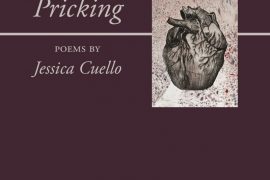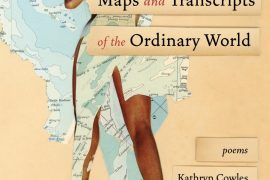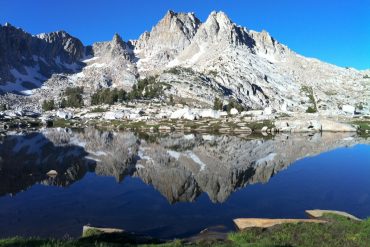"I am Appalachia... How can you find rapport with me— You, who never stood in the bowels of hell, Never felt a mountain shake and open its jaws To partake of human sacrifice?"
In a well-chosen epigraph by fellow Appalachian poet Muriel Miller Dressler, V.C. McCabe hints at every major thread that weaves through her poetry collection Give the Bard a Tetanus Shot: sense of place, environmental destruction, environmental justice, religion and faith, and the cultural barriers that separate humans from one another. The poems that follow range over territory as diverse as natural disasters, small town picnics, the meth epidemic, immigration, and returning to one’s childhood home, creating portraits of speakers who see the world in all its complexity, and neither idealize nor demonize what they observe.
A central concern of this collection is what defines Appalachia, the Rust Belt, and the state of West Virginia—and what makes the region different from the rest of the nation and the world. If a person is formed by a place where natural and human-made disasters come one on the heels of the other, how can someone from another place, a place where these things supposedly don’t happen, understand them?
How the hell am I supposed to write poetry in the dirty, crowded parking lot of the local Piggly Wiggly—
the speaker of the titular poem asks, imagining classical poets in crumbling castles, and New York poets in their bustling and prosperous city, while the Piggly Wiggly parking lot instead furnishes meth addicts and drug dealers for inspiration. The poems don’t answer the question directly, but indirectly and cumulatively.
What defines Appalachia? Eight of the fifty poems in this collection are occasional poems written about environmental disasters, either human-caused or natural. Two poems involve trying to escape fire/tornado in a car. There are floods and derechos. There are chemical spills. Other poems need no occasion to address the same concerns. Environmental disasters are simply part of everyday life. “Would the twister reach us before the river?” the speaker of “Tilt-A-Whirl” wonders in a line whose figurative meaning encompasses poverty, drugs, lung disease, and the myriad everyday crises the communities in these poems face.
“Trestle” begins with an epigraph from Thornton Wilder’s Our Town, setting the poem up as an expansion of Wilder’s “This is the way we were…in our living and in our dying.” McCabe’s “Our Town” has “rusted rails” and “rotted ties—ruins.” The speaker of the poem recalls
smiling in summer light. Before life reduced us, subtracting our numbers, one by one.
This kind of pain and suffering is directly linked to the environment and its natural and unnatural events. “Trestle” closes with the image of “canyons of pain,” and the next poem, “Watershed,” written after a thousand-year-flood, begins: “Never give your heart to a body / of water.” Human lives are deeply intertwined with the life of the earth: water, air, soil. “Like a wayward lover,” the poem continues, “it will only hurt you in the end.”
Throughout these poems, McCabe draws connections not only between humans and the planet they occupy, but also between the landscape and faith. The poems deftly turn from one to another, as when “For Want of an Ark” transforms the water from “Trestle.” Both poems respond to the flood of June 2016, but, in one, the river is a hurtful lover, and, in the other, it is “preying on pews” and desecrating cemeteries and churches, sparing nothing, no one:
unearthing and emptying graves to fill their vacancies with flood victims.
The cumulative effect is a claim that all of these things are connected: human life, the life of the earth, and faith, the life of the spirit.
McCabe’s religious imagery is less about religion in the conventional sense than it is a way to convey the state of the environment in these poems. At times, McCabe’s speakers talk of faith itself, but more often the poems echo imagery and symbols from the Book of Revelation, painting a picture of a community where, as McCabe describes it in “Give the Bard a Tetanus Shot,”
the Bible Belt’s buckle ever tightens the Rust Belt— surrounded by nothing but decay and desperation.
The poems contain plagues of fire, flooding, moving earth, and hands blistering from the water in the tap. In “Baptism by Fire,” McCabe transforms the religious into its earthly version in a coal plant chemical spill that contaminates the water supply.
We are now immaculate! Holy coals burning so bright— in our scorched skin, our blackened lungs.
The Elk River chemical spill referenced in the poem was so toxic that residents could not bathe in the water from their taps. The spill affected nine counties, a substantial section of West Virginia, calling to mind Revelation 8:8, in which “a third of the sea became blood, a third of the living creatures in the sea died” or Revelation 19:20, in which there is a “lake of fire that burns with sulfur.” These echoes may or may not be intentional, but McCabe’s poems of disaster carry the connotation that these events are not unlike the end of the world.
“Baptism by Fire” seems to refer indirectly to another environmental disaster: mountaintop removal mining, describing the “sunken kingdom” where the speaker lives. The next poem’s title, “Cover Us with Mountains” implies the same process by which the surface of mountains is blasted and scraped away to reveal coal seams. These images also occur in Revelation 6:14: “every mountain and island was removed from its place.” The transformative power in these poems is, however, not God, but humans, and faith is not a faith that God will take care of everything, but rather a more futile ritual of unanswered prayers or hope of an afterlife.
Some of these poems document natural disasters outside of Appalachia, showing that the Rust Belt is not the only place experiencing repeated disaster. “Out of the Frying Pan into the Fire” describes the Florida wildfires of 1998, in which nearly eight hundred square miles of land burned. There is a sense that the way of the world—of nature and God—has gone awry. In “The Old Toot-N-Tellem,” another occasional poem after a thousand-year-flood,
the old folks talk about climate change, about loss. I never believed in global warmin’, but the river ain’t never got so high!
FEMA workers appear, and the survivors of the flood watch the workers mark condemned houses in red, like a biblical ritual gone wrong. In the book of Exodus (12:21–23), Moses instructs the elders of Israel to mark their houses with lamb’s blood so that God will know to strike down the Egyptians, and not them. But in McCabe’s poem, the marks mean destruction, not salvation. The traditional ways of belief, of operating in the world, have been turned upside-down.
One of the dangers of poems that obsessively document the misfortunes and known facts of a particular region is that they risk exploiting conventions and tropes. These poems certainly do that to some extent, but one of the qualities that saves them from being just more Rust Belt poetry about poverty, opioids, and mining pollution is McCabe’s straightforward and unpretentious language peppered with wry humor (as indicated in the collection’s title). While the language is often prosey, McCabe can employ a line break to devastating effect, as in “Fire-tongued Labyrinth”:
Fireflies have no faith nor need of
The reader hangs there, breathless at the thought. And then McCabe brings the poem down to earth again:
Fireflies have no faith nor need of sun and fluorescent bulbs
In “#NoFilter,” the speaker lays out a philosophy of language that shapes all of these poems:
I feel my years without shame, without applause, happiness as acceptance, a raw nerve, a shriek of crows in my throat, behold my unabashed monstrosity, my blight of truth. I’ll take my pain over its absence.
Pain is what unites these poems and all of the people in them. The speakers are not navel-gazing, but rather looking out at the world to see the pain of the ancestors who immigrated from Ireland, the townspeople whose homes are lost, the landscape in ruin, the waters expressing their rage. In “Solastalgia,” one of the very last poems of the collection, the speaker returns home after a long absence and says plainly: “Every place in my memory was gone,” McCabe names this pain: solastalgia, defined in an epigraph as “the distress caused by environmental change.”
How will you find rapport with someone from Appalachia? Through the other idea that weaves through this collection: what happens in Appalachia is also happening in the rest of the world. Appalachia is at ground zero because it has long been the site of coal mining and timber extraction, but the environmental disasters are spreading, and natural disasters are beginning to affect everyone, as is climate change. If the West Virginia setting of these poems is like the Book of Revelation, “the hour of trial that is coming on the whole world to test the inhabitants of the earth” (3:10), then this is all of us, no matter where we are on this planet. The closing poem, “The Parting Glass” brings this idea home by connecting far-flung parts of the world. The poem incorporates elements of industry and environmental destruction, but also offers hope.
the town square’s antiquated shops still smoke after desecration by fire, two rivers converge, crowned by Blue Ridge Mountains, crossed by steel and timber railroad bridges
From this specific place, the speaker imagines the Appalachian Trail winding into the “northern wilderness,” then continuing on across the ocean to Ireland, the land of the speaker’s ancestors, until finally the trail arrives in a pub to toast all the mountains climbed “between the / rivers Shenandoah and Shannon.” The image posits that what connects Appalachia to the rest of the world is not just environmental disaster but also natural beauty, the trail walked, and the life lived. We are all connected to Appalachia.





